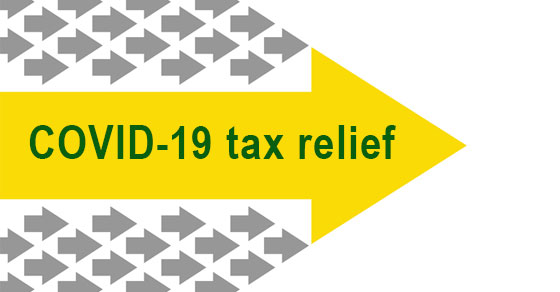Weekly Tax Brief
The CARES Act liberalizes net operating losses
- Details
- Published: 08 May 2020 08 May 2020

The CARES Act includes favorable changes to the rules for deducting net operating losses (NOLs) to provide businesses with relief from the novel coronavirus (COVID-19) crisis. It permanently eases the taxable income limitation on deductions. For tax years beginning before 2021, the CARES Act removes a taxable income limitation on deductions for prior-year NOLs carried over into those years. So NOL carryovers into tax years beginning before 2021 can be used to fully offset taxable income for those years. These changes may affect prior tax years for which you’ve already filed tax returns. To benefit from the changes, you may need to file an amended tax return. Contact us to learn more.
New COVID-19 law makes favorable changes to “qualified improvement property"
- Details
- Published: 04 May 2020 04 May 2020

A law providing relief due to the coronavirus (COVID-19) crisis contains a valuable change in the tax rules for improvements to interior parts of nonresidential buildings. You may recall that under the Tax Cuts and Jobs Act, any qualified improvement property (QIP) placed in service after Dec. 31, 2017 wasn’t eligible for 100% bonus depreciation. The cost had to be deducted over 39 years rather th an entirely in the year the QIP was placed in service. This was due to a drafting error by Congress. But the new CARES Act now allows most businesses to claim 100% bonus depreciation for QIP as long as requirements are met. The correction is retroactive to QIP placed in service after Dec. 31, 2017.
Read more: New COVID-19 law makes favorable changes to “qualified improvement property"
IRA account value down? It might be a good time for a Roth conversion
- Details
- Published: 28 April 2020 28 April 2020

The coronavirus (COVID-19) pandemic and the ensuing stock market downturn has caused the value of some retirement accounts to decrease. But if you have a traditional IRA, a downturn may provide a valuable opportunity: It may allow you to convert to a Roth IRA at a lower tax cost. Roth IRA qualified withdrawals are tax free and you don’t have to begin taking RMDs after you reach age 72. But if you convert to a Roth, you’ll owe income tax on the converted amount. If your traditional IRA has lost value due to a market downturn, converting to a Roth now will minimize the tax, and you’ll avoid tax on future appreciation. Interested? Contact us to see whether a conversion is right for you.
Read more: IRA account value down? It might be a good time for a Roth conversion
Answers to questions you may have about Economic Impact Payments
- Details
- Published: 21 April 2020 21 April 2020

Millions of eligible Americans have already received their Economic Impact Payments (EIPs) via direct deposit or paper checks, according to the IRS. Others are still waiting. The payments are part of the CARES Act. Is there a way to check on a payment status? A new IRS tool called “Get My Payment” shows taxpayers either their EIP amount and the scheduled delivery date, or that a payment hasn’t bee n scheduled. It also allows taxpayers who didn’t use direct deposit to provide bank account details. Some people are getting an error message (“payment status not available”). Hopefully, the IRS will have it running seamlessly soon. Access the tool here: https://bit.ly/2ykLSwa
Read more: Answers to questions you may have about Economic Impact Payments
2020 - 04/06 - Answers to questions about the CARES Act employee retention tax credit
- Details
- Published: 16 April 2020 16 April 2020

Read more: 2020 - 04/06 - Answers to questions about the CARES Act employee retention tax credit
Coronavirus (COVID-19): Tax relief for small businesses
- Details
- Published: 30 March 2020 30 March 2020

Is your business affected by the coronavirus (COVID-19)? Fortunately, the Families First Coronavirus Response Act recently became law. It includes paid leave benefits to employees; employer and self-employed tax credits; and FICA tax relief for employers. The IRS also issued guidance allowing taxpayers to defer some federal income tax payments and estimated tax payments due on April 15, 2020, until July 15, 2020, without penalties or interest. “There is no limitation on the amount of the payment that may be postponed,” the IRS stated in Notice 2020-18. Plus, the IRS announced the 2019 income tax FILING deadline will be moved to July 15, 2020 from April 15, 2020. Questions? Contact us.
Read more: Coronavirus (COVID-19): Tax relief for small businesses
Individuals get coronavirus (COVID-19) tax and other relief
- Details
- Published: 26 March 2020 26 March 2020

Taxpayers now have more time to file their returns and pay any tax owed because of the coronavirus (COVID-19) pandemic. The IRS announced that the filing due date is automatically extended from April 15, 2020, to July 15, 2020. Contact us with any questions.
Read more: Individuals get coronavirus (COVID-19) tax and other relief
COVID-19 Office Update
- Details
- Published: 19 March 2020 19 March 2020
On March 19, 2020 per Governor Wolf’s orders to close all non-life sustaining businesses, Smoker, Smith & Associates, PC will be closing its physical office location and continuing operations virtually until further direction is received.
We expect our “office” to be fully operational during this period and will be working hard to ensure that the steps we’ve taken will be seamless to our clients.
STAFF AVAILABILITY:
Virtual offices will remain open:
M-F 8am – 5 pm
Please call our main office line at 717-533-5154. If a team member is not available at the time of your call, please leave a message and be assured your call will be returned in a timely manner.
IF YOU WOULD LIKE TO SCHEDULE AN APPOINTMENT:
Our staff will be scheduling client appointments via conference call or web conference until further notice.
Please call our office at 717-533-5154 or contact your accountant directly to arrange an appointment.
IF YOU HAVE DOCUMENTS THAT NEED TO BE DROPPED OFF:
We are encouraging all clients to deliver documents electronically through our secure client portal.
You can access the portal by visiting www.smokersmith.com. Should you need assistance or need to be set up a portal, please call our office at 717-533-5154 or email This email address is being protected from spambots. You need JavaScript enabled to view it..
While both doors to the outside of the building have mail slots for information to be dropped off, please be advised that we are not maintaining physical office hours. We will collect any dropped off information daily.
IF YOU ARE PICKING UP INFORMATION:
At this time, we are unable to deliver returns via in-person pick up. When your return is completed, we will contact you to discuss options available for receiving and submitting your returns.
We appreciate your patience and understanding. We will continue to provide you with a “Higher Level of Commitment,” as we work through this unprecedented situation.
Why you should keep life insurance out of your estate
- Details
- Published: 18 March 2020 18 March 2020

If you have a life insurance policy, you probably want to make sure that the life insurance benefits your family will receive after your death won’t be included in your estate. That way, the benefits won’t be subject to the federal estate tax. Under the estate tax rules, life insurance will be included in your taxable estate if either: 1) Your estate is the beneficiary of the insurance proceeds, or 2) You possessed certain economic ownership rights (called “incidents of ownership”) in the policy at your death (or within three years of your death). There are other strategies for keeping insurance out of your estate. Contact us for more information about your situation.
Read more: Why you should keep life insurance out of your estate
The 2019 gift tax return deadline is coming up
- Details
- Published: 11 March 2020 11 March 2020

If you made large gifts to your children, grandchildren or others in 2019, it’s important to determine whether you’re required to file a gift tax return by April 15 (Oct. 15 if you file for an extension). If you’re not sure whether you must (or should) file a 2019 gift tax return, contact us.





